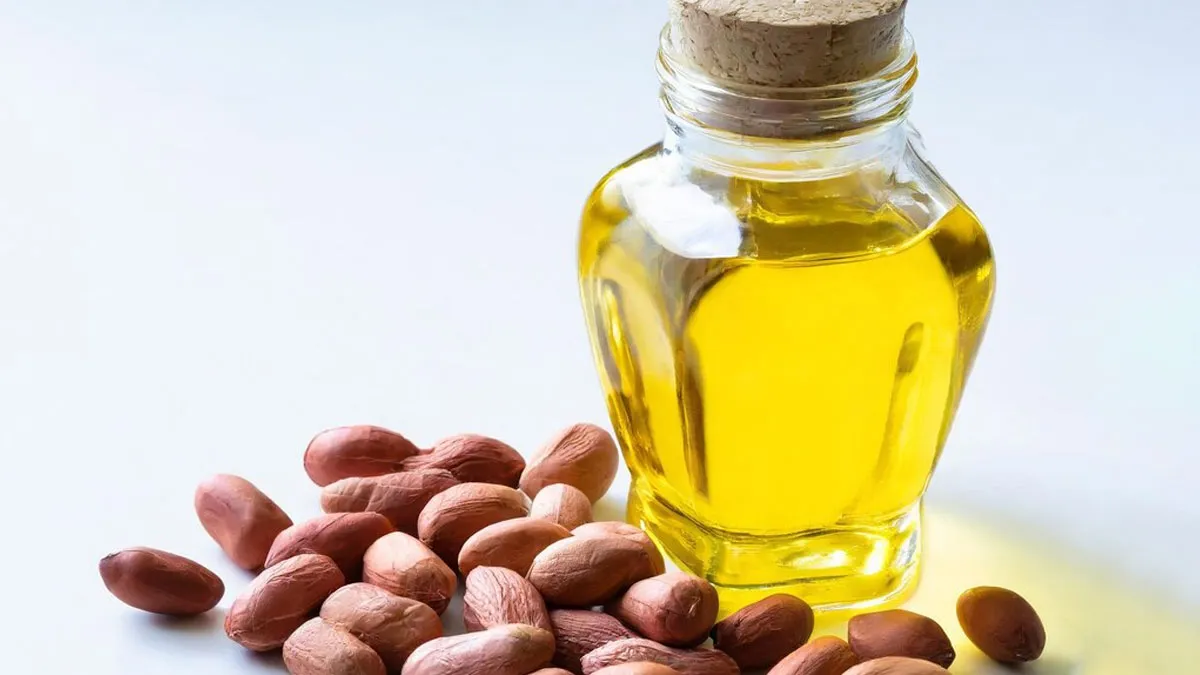
For many of us, the cooking oil we choose often goes overlooked; it simply enhances the flavour of our dishes. However, what if your everyday cooking oil could offer additional benefits? Peanut oil, a common kitchen staple in numerous cultures, does just that. It is rich in heart-healthy fats, essential nutrients, and antioxidants and is much more than just a cooking ingredient. It not only supports heart health but also nourishes the skin and hair. For anyone looking to add a healthy dimension to their meals, peanut oil is worth considering.
Table of Content:-
According to a study published by Critical Reviews in Food Science and Nutrition, peanut oil is extracted from shelled and crushed peanuts using various methods, including hydraulic pressing, expeller pressing, and solvent extraction. Generally, there are three main types of peanut oil: refined peanut oil, gourmet peanut oil, and 100% pure peanut oil.
Health Benefits Of Peanut Oil
1. Rich in Heart-Healthy Fats

Peanut oil is rich in monounsaturated and polyunsaturated fats, which are often referred to as 'good' fats. These fats have been shown to lower levels of bad cholesterol (LDL) while helping to maintain good cholesterol (HDL). Decreasing LDL cholesterol levels can reduce the risk of cardiovascular diseases, such as heart attacks and strokes. For those looking to improve their heart health through dietary changes, peanut oil is an excellent alternative to oils high in saturated fats.
Additionally, peanut oil contains omega-6 fatty acids, which are essential fats that the body cannot produce on its own. Omega-6 fatty acids can be beneficial when balanced with omega-3 fatty acids, as they support brain function, bone health, and hair growth. It’s advisable to consume peanut oil in moderation to maintain a healthy omega-6 to omega-3 ratio.
Also Read: What Are Benefits and Risks Of Peanut Consumption
2. High in Antioxidants for Cellular Health
One of the standout features of peanut oil is its rich antioxidant content. According to a 2014 study, peanut oil contains a balanced mix of fatty acids and antioxidants that help shield the body from harmful substances, particularly free radicals.
Antioxidants, including vitamin E, protect cells from damage caused by free radicals, which are unstable molecules that can lead to chronic diseases like cancer and heart disease. Vitamin E is particularly helpful for skin health, as it combats oxidative stress, helping to prevent premature ageing and maintain skin elasticity.
3. Promotes Better Blood Sugar Control

Peanut oil may also have positive effects on blood sugar levels. Certain studies suggest that monounsaturated fats, which are present in peanut oil, can enhance insulin sensitivity. According to a 2009 study, consuming peanut oil, rich in oleic acid, successfully reduced high glucose levels in all type 2 diabetic mice (8 out of 8), normalising these levels after a 21-day treatment with peanut oil.
Moreover, peanut oil has a relatively low glycemic index, which means it won’t spike blood sugar levels when included in meals. This feature can make peanut oil a suitable choice for people looking to control blood sugar swings.
Also Read: Here Are Reasons Why You Should Choose Peanut Butter Over Butter
4. A Natural Choice for Healthy Skin and Hair
Peanut oil is a natural option for nurturing both skin and hair. It provides essential moisture that helps keep skin smooth and resilient due to the presence of vitamin E. When applied directly, peanut oil’s soothing properties can alleviate dry skin and soften the appearance of fine lines and wrinkles.
For hair care, the fatty acids in peanut oil deeply nourish the scalp, helping to reduce dandruff and dryness. Gently massaging warm peanut oil into the scalp boosts circulation, which can encourage hair growth, leaving hair feeling soft, healthy, and revitalised.
5. A High Smoke Point for Safe Cooking

Peanut oil is a great choice for cooking at high temperatures, with a smoke point around 450°F (232°C). This high smoke point makes it ideal for frying, grilling, and sautéing, as it can handle the heat without breaking down and releasing potentially harmful compounds that could affect taste and health. Peanut oil stays safe and flavorful, making it a versatile option for those who love experimenting with different cooking techniques.
6. Supports Weight Management When Used Wisely
While all fats are calorie-dense, peanut oil can be part of a balanced diet that supports weight management. The monounsaturated fats in peanut oil are filling and help you stay satisfied after meals, which may prevent overeating. Replacing unhealthy fats with moderate amounts of peanut oil could help control calorie intake and support a balanced diet. However, moderation is key, as consuming too much oil, even healthy oil, can lead to unwanted weight gain.
[Disclaimer: This article contains information for informational purposes only, hence, we advise you to consult your own professional if you are dealing with any health issues to avoid complications.]
Also watch this video
How we keep this article up to date:
We work with experts and keep a close eye on the latest in health and wellness. Whenever there is a new research or helpful information, we update our articles with accurate and useful advice.
Current Version